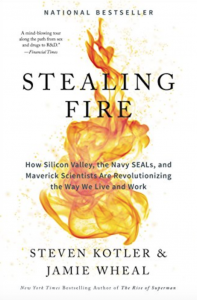Digital Transformation: Are You Ready?
Display Transcript
Let me ask you this: What do video games, caffeine, extreme sports, pornography, alcohol, and social media have in common? Moreover, why do we, as a global society, chase after these things (and things like them) as much as we do?
As it turns out, all of the things I just listed are ways that we try to escape or alter our sense of reality, for better or for worse. We spend so much of our time and money trying to get out of our own heads. Authors of Stealing Fire, Steven Kotler and Jamie Wheal, looked into how much we spend in pursuit of escaping or changing the state of our own minds, and dubbed it the “Altered States Economy.” We spend roughly four trillion dollars annually on trying to change or alter our perception of reality. The feeling that we are really chasing after, whether we recognize it or not, is an altered state of mind known as “ecstasis.” The word ecstasis comes from the ancient Greek scholars who studied this idea of “getting out of your own head,” and is the root of the English word “ecstasy.”
But what is ecstasis? If it has been around for so long, why haven’t more people heard of it before? As it turns out, there have been major breakthroughs in the study of ecstasis in the past 50 years that simply have never been possible until now. Thanks to the digital and technological revolution we are going through, the case for ecstasis may finally be realized to its full extent for the first time in human history.
Now, you’re probably still a bit confused about what exactly ecstasis is, so let me break it down for you a little bit.
Ecstasis is best described as an altered state of consciousness. From a neurobiological standpoint, is characterized by the increased presence in the brain of at least a few of the Big 6 neurochemicals. Those six are: Norepinephrine, Dopamine, Endorphins, Anandamide, Serotonin, and Oxytocin. Speaking more qualitatively, ecstasis is characterized by four forces: Selflessness, which is a disconnect from our normal and accurate perception of ourselves; Timelessness, which as its name suggests, is an inability to accurately sense the passage of time; Effortlessness, a state in which things seem much easier to do and large tasks are less intimidating; and Richness, which describes a drastic increase in the amount of information a person can take in and process at a given moment.
If you think along the lines of “Time flies when you’re having fun” and then crank it up a few notches, you’ll start to get a good idea of what ecstasis is.
There are elements of ecstasis in our culture that we have been aware of for a long time, but we typically wouldn’t think of them as such. The idea of disconnecting from your life to gain some perspective is something most people would be familiar with. Think about how much you value your vacations from work and school and think about why companies go on corporate retreats. Disconnecting from the way things normally are in order to improve them is what ecstasis is all about.
Ecstasis has been studied for a long time, but thanks to the recent revolutionary studies done on it in the fields of Neurobiology, Psychology, Pharmacology, and Technology development, we now understand physically what is happening in the brain during ecstasis better than we ever have. Not only can we understand it, but there are several techniques that can reliably induce ecstasis, like electrical therapy to certain parts of the brain, or micro-doses of different drugs, or sensory deprivation. The list goes on, but why would we go to all this trouble to recreate ecstasis?
As it turns out, studies over the past few decades have reliably shown that experiencing this altered state of consciousness dramatically increases a person’s creativity, productivity, and capacity to learn new things both during the ecstatic moments, and for prolonged periods afterwards. The world’s most elite organizations and individuals are already leveraging the transformative power of ecstasis with incredible success. The founders of Google are big proponents of ecstasis, and so is the Navy SEALS most elite group, SEAL Team Six. The Navy SEALS, for example, have leveraged ecstasis to reduce the time it takes their operatives to learn a foreign language from six months all the way down to six weeks. Even one of the most influential tech gurus of our time, Elon Musk, is a proponent of ecstasis.
Now, I’m giving you all these examples because I want you to believe me when I say that ecstasis has immense potential to transform the way we live our lives, but what is the best way to reach ecstasis? The answer is: there isn’t one. We all have to find the way that gets us to this state that suits us best. The way we figure that out is through the use of what is called the “Ecstatic Value Equation,” which goes like this: Value is equal to Reward divided by Risk multiplied by Time. The value of a given activity is determined by the potential reward from doing the activity divided by the potential risks and harms of said activity, then multiplied by the amount of time it takes to reliably reach ecstasis because of that activity. The resulting value is a personal one, so you will likely value certain activities differently than other people might. Think of how you value might value going for a long walk on a beach compared to how you would value going sky diving. If you can understand the difference in how you value practicing yoga every morning for a year versus going on a two-day LSD bender, then you understand how to answer your Ecstatic Value Equation.
All in all, ecstasis has the potential to transform your life by altering the way your brain functions for short periods of time. It can increase your ability to be creative, productive, and enable you to learn new things faster and more fully than you ever have. When it comes to figuring out the messy problems that we face in this new digital era, and how we are going to need to be, I think ecstasis is one of the best ways to figure those things out.
However, it would be remiss of me to not offer a word of warning.
Balance is critical when it comes to ecstasis. There’s a reason laws and social norms exist: to protect you. While things like drugs or alcohol could potentially get you to ecstasis, they are much more likely to cause you harm. Hear me say this: please don’t harm yourself in the pursuit of ecstasis. There is a reason that not very many people jump off of cliffs with only a wingsuit: it is insanely dangerous, but it can also give you the biggest adrenaline rush you’ve ever felt. I am in no way endorsing self-destructive behaviors, but I don’t want you to completely write off what the occasional sky diving experience can do for you. As long you remember that ecstasis is meant to transform your life, not consume it, I think you’ll be good to go.
Now, I realize that trying to understand ecstasis can seem a bit overwhelming, so if you are interested in learning more, I’d recommend reading Stealing Fire by Steven Kotler and Jamie Wheal, and if you are interested in more topics relating to the change the new digital era we are entering is bringing, check out the Lockheed-Martin Leadership Institute’s project on Digital Transformation on Listen4Instight.com.

Change Your Brain, Change Your World
Stealing Fire: How Silicon Valley, the Navy SEALs, and Maverick Scientists are Revolutionizing the Way We Live and Work by Steven Kotler and Jamie Wheal is a fantastic read on how changes in brain chemistry can lead to dramatic increases in our abilities to solve complex problems. We are able to change our brain chemistry through a number of activities, be that meditation, thrill-seeking, music, or even psychoactive drug use. The choice on how to get there is up to the individual but being able to leverage this altered state of consciousness that Kotler and Wheal dubbed “ecstasis” has been proven to yield incredible, real world breakthroughs on some of society’s most complex modern problems.
For myself, my biggest take away is how valuable it is to give your conscious mind a break occasionally to let your subconscious mind take over. In Stealing Fire, they talk a lot about how the conscious mind is potent tool for logical thinking and organization, but the unconscious mind is far superior at pattern recognition and analyzing large amounts of information quickly. So, when we are stuck on “wicked” problems that don’t have an easy logical answer, it is good to have a way to break the patterns of thought we fall into. In a practical sense, I have been learning how to play the acoustic guitar as a way to give my analytical mind a break during the day. Music has been shown to change brain activity and potentially increase creative problem-solving abilities. My goal is to make practicing guitar a “mental rest-stop” for my brain in order to give distract my conscious mind with music and let my subconscious mind work on other problems. I very highly recommend reading Stealing Fire and figuring out for yourself what you can do to alter your brain and change your world.

Cameron Burgess
Member of Cohort 7 of the Lockheed Martin Leadership Institute
View Biography
Cameron Burgess is currently a Biomedcial Engineering major with an Electrical Engineering minor at Miami University, graduating in May 2020. He is a member of Cohort 7 of the Lockheed Martin Leadership Institute, where he is developing leadership skills and growing his vision of who he will be as a young professional. He is also involved in the Grand Challenge Scholars Program, where he participates in additional classwork and experiences that relate to his focus on the challenge of engineering better medicines. Additionally, Cameron is the Parliamentarian of the Beta Xi chapter of Phi Sigma Pi, the National Honor Fraternity at Miami University. Outside of school, he enjoys reading, playing video games with friends, playing guitar, and trying new foods on a regular basis.
In the Lockheed Martin Leadership Institute, Cameron is working on Cohort 7’s project on Digital Transformation. He is serving as the lead of the content team, where he organizes contacting professionals who have experienced digital transformation in the work place. He will be interviewing a few top experts on digital transformation for their insights on what the future will look like for leaders, and how young adults can best prepare for this. Cameron is also aiding in researching how people will need to be comfortable with change in the coming digital age, and is working in his own life on effectively dealing with the rapid change that graduation and entering the work force will bring.
